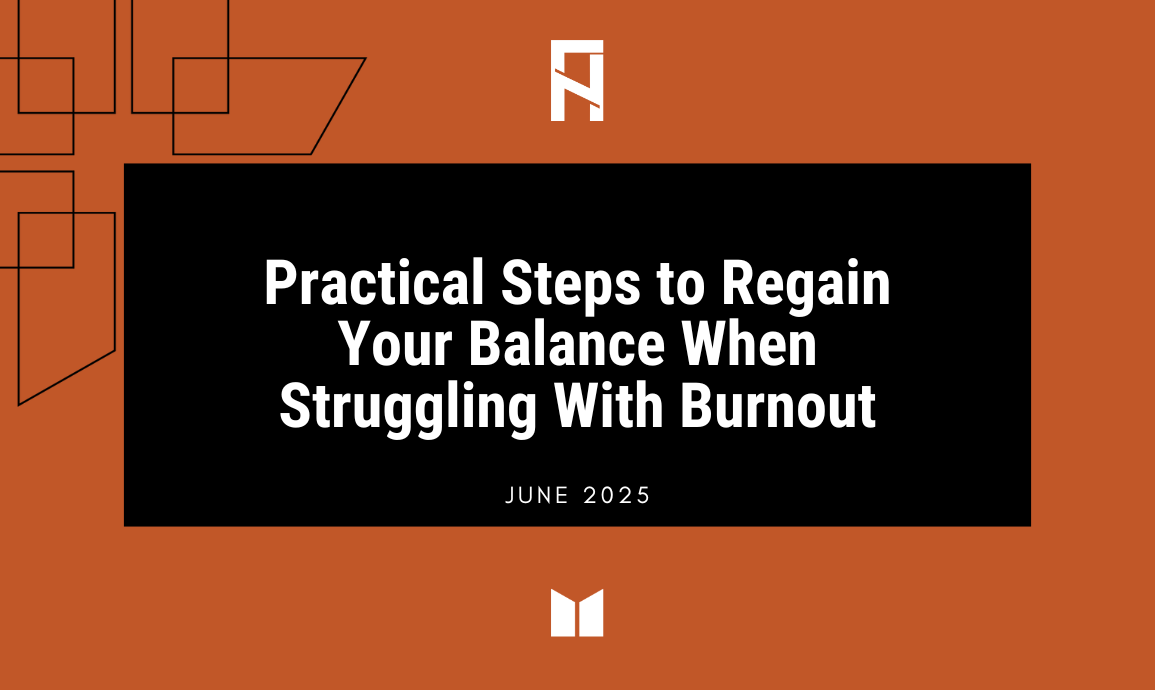Jack Shaw
Burnout isn’t always a breakdown. It can show up subtly — constant fatigue, reduced motivation and emotional distance from things you used to care about. This state can be confusing and even shameful for young men trying to stay focused, productive and grounded in their values. However, burnout is a biological and psychological condition — not a moral failure. It means your system has been under too much strain for too long without recovery.
The good news is that you can rebuild balance. These four practical steps will help you regain your footing — whether your burnout stems from work, school, ministry or emotional overload.
1. Make Rest a Priority
Rest is often seen as a reward for hard work. However, it isn’t something to deserve — it’s something to build into your life deliberately — like eating or breathing. Chronic sleep deprivation weakens the immune system, impairs judgment and increases the risk of depression. Without adequate rest, your body and decision-making suffer.
Prioritize sleep hygiene. Set a regular bedtime, avoid caffeine after midday and cut screen time before bed. A dark, quiet room with cool temperatures helps your body transition to sleep faster. Try journaling or deep breathing techniques if you struggle with racing thoughts.
Beyond sleep, incorporate active rest: light walks, hobbies that relax rather than stimulate, and quiet time alone or with someone who brings you peace. Rest is not laziness — it’s preparation for endurance. If you’re spiritually inclined, view it as obedience to a principle that even creation followed — one day of rest for every six days of work.
2. Focus On What Matters
Misaligned priorities are a core cause of burnout. When everything seems urgent or important, your energy gets scattered. You overextend yourself for things that may not serve your long-term goals or values, which is a fast track to emotional exhaustion.
Audit your life practically. Write down every ongoing commitment — school, work, side hustles, church role and family obligations — and rank them according to necessity. Then, ask yourself which ones stretch you too thin and don’t offer anything in return.
Burnout sets in when demands outweigh professional and personal resources — increasing stress levels. If you’re saying yes to everything, you’re giving your energy away without checking your reserves. Learn to say no to the good so you can say yes to the best. You might feel guilty at first, especially if you like to help others. However, letting go of unnecessary obligations allows you to better serve in the areas that align with your purpose.
3. Find Calm Through Faith
Burnout can dull spiritual senses, making prayers feel hollow and scriptures distant. You may wonder if you’re drifting from your faith. Often, this is emotional depletion — not disinterest. Persistent anxiety is one of the most common symptoms of burnout, especially when you’re stressed and worried because you feel disconnected from your sense of purpose.
When anxiety rises, so does the pressure to fix all aspects of your life because you don’t want to fail. You might feel like you’re not praying hard enough or that worry is a sign of weakness. This only feeds the cycle — more anxiety means more pressure. Look for quieter moments of connection, like a deep breath in prayer, a scripture that brings you comfort, spiritual music that grounds you or a simple prayer to God saying you’re overwhelmed and you just need His comfort.
Faith practices like prayer, meditation and scripture reading can reduce symptoms of anxiety — but only when you approach it as a source of comfort — not an obligation. If you want to share your emotions with a higher authority, speak to your priest, pastor or counselor. Anxiety doesn’t mean you’re spiritually broken — it means your system’s asking for rest and reassurance.
4. Stay Connected to Others
Burnout often leads to isolation as you withdraw to conserve energy and avoid judgment. However, the more isolated you are, the more burnout feeds on that loneliness. Social connection is a powerful buffer against stress.
You don’t have to share your feelings, thoughts and emotions with everyone, but choose one or two good friends, a brother or leaders whom you trust and can seek counsel from. Let someone into your world who will advise and guide you or just listen.
If you’re not keen on sharing your personal life with your brothers, consider counseling. Only about 17% of men seek therapy — the rest equate it with pressure, embarrassment or shame. However, those who do often experience quick recovery from burnout and stress-related issues. Accountability doesn’t need to be formal, but choose a person who checks in on you to ensure you’re taking care of yourself and reminds you to share the stress load.
Build Slowly and Steadily
Burnout signals a need for rebalance. Healing doesn’t happen overnight — small, steady steps can rebuild your strength and clarity. Resting, focusing on what matters, finding calm and staying connected to others are long-term strategies for a healthier, more grounded lifestyle. Whether you’re stressed, anxious, or feeling off track, applying these practices can help you recover.






